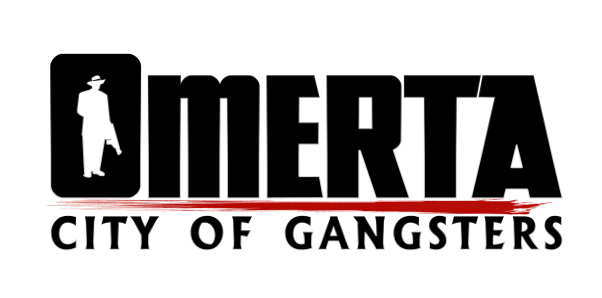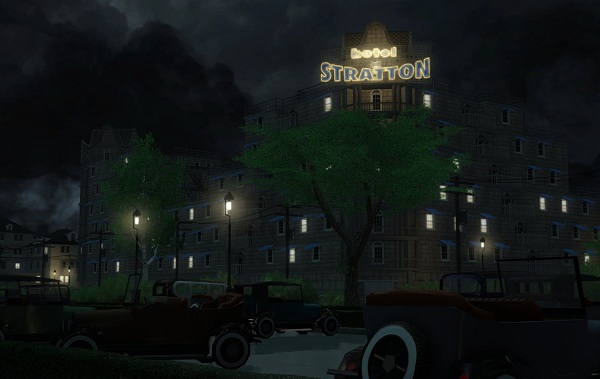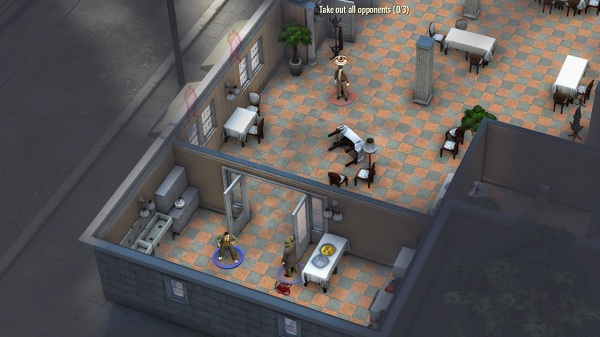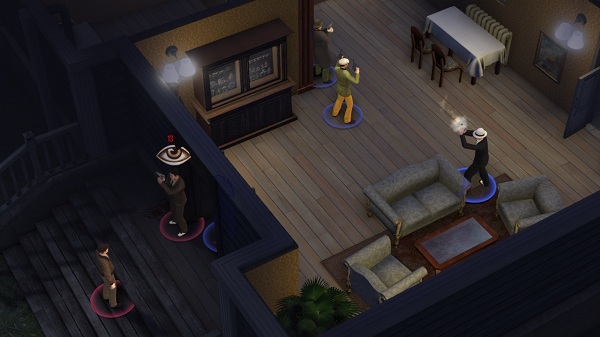Omerta — City of Gangsters is a brand new strategy game from the folks at Kalypso Media and Haemimont Games the developers behind the most recent iterations in the Tropico series. What Omerta does is offer you a lasting story-based economic strategy set in the extremely popular prohibition-era America, inter-spliced with tactical combat and balancing the books, a very good recipe indeed! However unfortunately for some, this is not the city builder that you are looking for.
Set in Atlantic City in the roaring 20s; the prohibition is in full swing, and Omerta — City of Gangsters couldn't get any closer to its subject matter, its overarching story is a regular clichéd Mafioso tale, and whilst very scripted, the almost free quality of the level-based missions feeds you a different way to play the game in a few hours. You may be asked to raise $10,000, and it's up to you whether you obtain it with a no-nonsense bank heist, selling beer from your speakeasies, or simply buying and selling goods on the market. What is refreshing is there is no truly advantageous way to go about it; and if you really want to get money the easy way there are always big risks involved.
This is how the core mechanics of the game are kept fresh in a title that contains a life span of well over 20 hours in the single player campaign alone, and there are a wealth of different opportunities to make your dirty money with shady joints and premises that allow you to set up boxing arenas, pawn shops, weapon stores and the more iconic speakeasies. But that's not all, as you progress further into the story you'll come across Construction Lots that give you the option to set up a selection of 'clean' businesses such as night clubs, lawyers and casinos that open up a wholly new way to play the game.
The worlds of dirty and clean money fashion an interesting spin on the economic strategy, early on you'll be dealing strictly with dirty money obtained from crooked joints and premises, but later on clean money is eased into your understanding, and you’ll be opening legitimate business ventures like renting property, or hotels. It's a lucrative trade, and the most profitable of the game, as clean money can be used in the place of dirty money, you’ll even be able to offer your services laundering dirty money for a high cost through jobs with the elite of Atlantic City where another element of the games' money making schemes come forth.
A little strategy gem that crops up every now and again in the genre is playing the market, and thanks to Omerta's jobs page you can buy and sell between various individuals. Your contact in New York may need to offload a large amount of beer at a cheap price, and conveniently there’s a desperate Irishman willing to pay double what you paid. It gets extremely satisfying and if you played Theme Park for the fun of buying and selling refreshments alone you will find the jobs are an addictive addition to the game, and whilst not essential to play, they add an extra dimension to the tycoon gameplay.
If you’re into economic strategies what appears as the biggest concern of the game is its pace, Omerta is at heart a strategy game, and is very fitting to the tycoon subgenre like Gangsters — Organised Crime. Unfortunately during the first third of the campaign you do find yourself left to twiddle your thumbs waiting for your gangsters to complete missions and jobs, and there's no time compression to remedy it, for the same reason, the sandbox mode can become quite stale. Which is unfortunate because sometimes all strategy gamers want to do is sit back and watch the money roll in, and for a few very obvious reasons that we’ll get to later, this is just never an option.
Now the combat in the game is tactical much like Jagged Alliance, it will undoubtedly also pull comparisons to the more recent X-COM: Enemy Unknown, however Omerta doesn’t simply use the standard tactical model, and there's a twist when it comes to taking turns; rather than carry out actions as a squad, each individual combatant will attack in turn dependant on certain skills. Like the best tactical strategy's of recent, cover is essential as your main defence in Omerta, however to counteract this, there is only so long a gang member will tolerate being shot at.
The most important factor in combat is your characters bravery; if you allow your men to be shot at they'll lose courage, a large drop in courage will make your characters panic, and lose their valuable action and movement points, pretty much limiting everything they can do in a fight. It sounds unfair, but thanks to a wealth of talents and perks, even the worst situations can be turned into a tactical battlefield.
Each character in the game is pre-determined, unlike X-COM or Jagged Alliance your characters are picked from a pre-existing roster, and so there is only so much you can customise of them, this is where perks come in. Each time your gang levels up you can give your active members a new perk that can simply boost a stat or skill up, or have the chance to change a fight that is not going in your favour, with perks that boost your squad's courage on a critical hit, or even increasing a characters accuracy on each shot fired. The perks give combat a brilliant variety, however you will find that if many of your characters focus on ranged attacks you'll end up giving them all the same valuable perks.
Talents on the other hand are fitted to each character, you have no choice in them, but a new one unlocks every few levels with a maximum of three, these are your last stands ranging from the ability to revive squad mates, boost courage across your line, and even throw grenades to take out groups of enemies, the talents are undoubtedly the strongest asset in battle, and by far the most effective, and so they are understandably balanced by only allowing most to be used once per mission, with some regenerating after a kill.
Now there is no permanent death for your sly gang in Omerta, however don't go thinking that this will hamper the experience of the game. If your gang fall in a combat that is not story centric, they'll shortly find a selection of themselves rotting away in a jail cell, at this point your lackey may as well as be dead, because unless you are about to finish the overarching mission, you'll need to break them out of jail, and just hope that your man power will suffice against an onslaught of suspecting police or army men. If however a gang member falls in a successful combat, they'll have a world of hurt coming their way with a wound for their slip-up, this may affect their movement points, health, accuracy, all manner of their makeup, and unless you've built a clinic they'll suffer for quite a while with their injuries.
With the most legendary Gangster tycoon Gangsters — Organised Crime still a firm favourite for many PC Gamers, Omerta does have its obvious differences, the biggest of which is your competition, because there is none; as a story based game gangster fights only arise when the story deems it necessary, for this very same reason the city doesn't actually grow, each 'mission' is self-contained and the only real antagonist in the game is the police, this may scare some off, however the combat and strategy elements of the game are quite the allure, as long as you don’t come to the game expecting a certain type of strategy, the best summation of the game would be to drop the words business, and simulation, hope we haven’t put too many people off!
Just like any organised crime tale, the wise-talking gangsters are never truly above the law, and whilst in Omerta you are free to do whatever you wish, be it burgle houses, steal from the military or just run a small speakeasy, nothing will go by unnoticed, and the longer you spend loitering around as you smuggle goods out of warehouses and bribe councilmen, your 'heat' will rise. Become too notorious and a full-scale investigation will be launched, let the investigation go ahead and you'll find your gang slung in the nick and game over. However it’s not difficult to dig yourself out, a simple bribe will make everyone forget, or if you're a little short on cash you can use a local independent business as a scapegoat, or even bust into the headquarters and dispose of the evidence, however unless you've the arsenal of a small army you'll probably not fair very well.
Omerta — City of Gangsters is primarily a single player, story based experience, however this is from the developers of Tropico that brought the sandbox tycoon game back to its rightful place, and so included in the game is a Sandbox mode which is somewhat stifled by the small maps and lack of city growth. It does pose a playground for trying out all of the buildings at your disposal, however compared to the 20+ hour campaign, the sandbox just did not manage to hold my attention as long.
However if you aren't wholly into the economic element of the game and are quite partial to roughhousing, Haemimont Games have included a multiplayer mode that allows those with a thirst for combat to duke it out with fellow wiseguys online, which is fantastic because the combat system does work exceedingly well, and nothing keeps you on your toes as much as playing a tactical strategy against a real player.
There's nothing better to ease you into the 1920s style with some good music, Illusion Softwork's Mafia: The City of Lost Heaven was intensified with its mix of Louis Armstrong and Hot Club de France, and whilst Omerta does not boast any authentic music from the period, it supplies a selection of jazzy melodies great to get you in the mood for some dodgy dealings. Unfortunately the same cannot really be said for the dialogue in the game, whilst the accents are spot on, each characters has two or three samples that get used over and over on the map and in combat, and it does get a little old at times.
The strategy genre is one not usually accompanied with the console market, however Haemimont Games have brought Omerta not only to the PC, but to the Xbox 360, and rather than feel like a rushed port, the Xbox 360 version almost feels like a whole different game, similar to their release of Tropico 4 it doesn't feel as though you are playing a pc game and everything is instead enacted with a series of button commands.
Despite not looking or feeling like a port the one problem that Omerta does suffer on the Xbox 360 is it is a strategy game, and strategy games are meant for quiet reflection, and investigation which is not entirely possible on console, tooltips are not present at first glance and text at times can be very small for a television screen. The tycoon element of the game does not feel as accessible as it does on a PC which is unfortunate as it does make up well over 70% of the game, thankfully the same is not said for the combat which is utilised perfectly on console making it unfortunate that they did not tweak the ratio of combat to tycoon for the different versions.
Omerta — City of Gangsters is a fantastic homage to a great and beloved game, whilst Haemimont Games have certainly put their own spin on the idea of the Gangster tycoon, it's wonderfully clichéd storyline, and truly engaging combat really stands out, whilst there are a few issues here and there, overall the game is a great addition to the niche of the Mafia strategy, just don’t go expecting Tropico meets X-COM, think of it more like a business simulation with guns.
Omerta — City of Gangsters is out now on the Xbox 360 and Windows PC for the SRP of £39.99 and £29.99 respectively, if you're as taken by the game as we were, then don't forget to enter our competition to win a Steam copy of the game and the Special Edition DLC.





